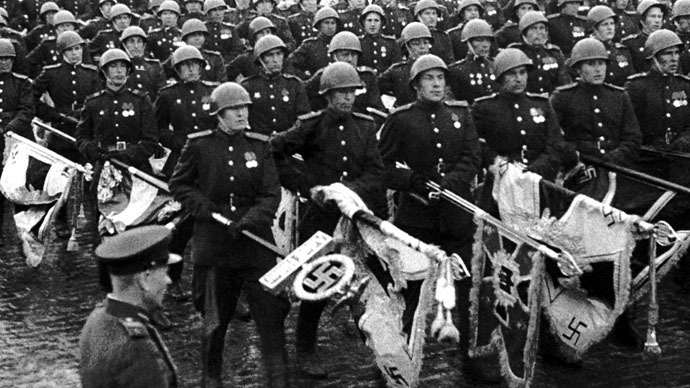Polish FM trolls Russia with V-Day insult, gets verbal volley

Moscow has accused Polish foreign minister Grzegorz Schetyna of “casting shame” upon his homeland, after the politician said it would be more apt to celebrate victory over Hitler in London, Berlin or Poland.
“This is the newest in a line of clumsy attempts by the Polish politician to cast doubt upon the results of World War II, and the role of the Soviet Union as the winner in that war,” said Russia’s deputy foreign minister Grigory Karasin, who insisted that Schetyna’s statements “brought shame upon himself, Poland’s diplomats, and its political establishment.”
The center-right politician, who recently needled the Russian establishment with his comments about it being Ukrainian, rather than Soviet troops, who were the first to liberate Auschwitz, continued to antagonize Moscow in a Polish radio interview on Monday.
“Why did we so easily accept that Moscow is the place where the end of the war is commemorated, not London or Berlin? It is unnatural to celebrate the end of the war in the place where it was started,” Schetyna, who assumed his post last year, told RMF FM.
READ MORE: Auschwitz Holocaust memorial ceremonies begin without Putin, Obama
The Polish diplomat was referring to the secret protocol of the Molotov-Ribbentrop Pact, signed in August 1939, under which Stalin’s USSR and Hitler’s Germany would carve up Eastern Europe. The Germany invasion of Poland on September 1 – followed by a Russian incursion from the east a fortnight later – is usually considered the official start of World War II in the West.
Russia acknowledges the terms of the Pact, but has historically justified it as a means of buying more time to bolster its military capacity, ahead of Hitler’s inevitable invasion.

The Kremlin is hosting grand celebrations to mark the 70th anniversary of the end of the war on May 9 – the day the Soviets signed the armistice with Nazi Germany in 1945. Between 21 and 28 million Soviet citizens died as a result of the war against Germany, more than in all the Allied states put together.
Moscow has invited all world leaders to attend the event and over 20 have already confirmed. But, Schetyna has suggested that instead, EU leaders should gather at Westerplatte, the first part of the Polish border breached by the Nazi blitzkrieg.
“The ceremony at Westerplatte offers an alternative perspective on WWII. It also a testament to European integration since that time. The idea has provoked a lively debate, and passionate reactions,” said Schetyna.
READ MORE: Poland lost chance to build bridges between Russia and Ukraine at Auschwitz – ex-PM
With EU leaders are keeping silent on their commemoration plans so far, and Moscow already annoyed by what it sees as Poland’s hijacking and politicizing of the date, Schetyna’s comments provoked outrage from several prominent parliamentarians.
The foreign affairs representative of the upper chamber of Russia’s parliament, Konstantin Kosachev, called Schetyna’s statements and plans “unacceptable.”
Aleksey Pushkov, a prominent deputy, who leads the foreign policy
committee lower chamber of the Russian parliament, the Duma, gave
an expanded explanation.
“Schetyna is not only demonstrating Russophobia, but an ignorance
of the facts,” tweeted Pushkov.
“There were 238 divisions fighting on the Eastern Front and only 68 in the West. Where is it more logical to commemorate the date – where the bulk of the enemy forces was defeated, or where the secondary conflicts took place?”
Of Germany’s military casualties – numbering at over 4 million – 80 percent occurred on the Eastern Front.












